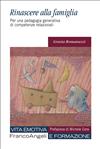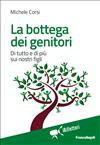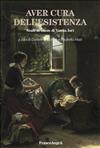
LIBRI DI MICHELE CORSI
La ricerca ha estratto dal catalogo 36 titoli









Per una pedagogia generativa di competenze relazionali
Il volume indaga il ruolo sociale e le funzioni educative dei genitori contemporanei, a partire dalla rilevazione di una difficoltà a intraprendere e portare a compimento un percorso di vita, evolutivamente generativo, non nelle modalità esclusive della procreazione, quanto, piuttosto, quale processo di innovazione e miglioramento.
Premio Siped 2023
cod. 1930.1.6

Di tutto e di più sui nostri figli
Non esistono i cattivi genitori. Al più, quelli pasticcioni. Ma, a riflettere su se stessi e formandosi al più difficile mestiere del mondo, tutti possono diventare competenti. Aiutando i figli a farsi creatori della propria esistenza, persone “libere” capaci di guardarsi dentro e di amarsi per ciò che sono. Non replicanti di stili genitoriali e nemmeno destinatari di “eredità” malmesse e disfunzionali.
cod. 637.7


To summarize this article with a single expression, we could enclose it in a lack, which has been widely argued on all its pages: the programming one. Moreover, there was a lack of planning and ability to predict for many institutions and most of the citizens. Or, still, there was often a failure to prevent, in order to remedy instead, and not always adequately. With a particular reference to Italy on these pages. The above-mentioned four limits or wounds are particularly serious for our country in this pandemic year. Furthermore, this pandemic caught everyone unprepared and inexperienced. And, then, too many people - I am referring to the Government here - sold themselves to a lot of virologists and various mass media exponents, etc., who have frequently ended up increasing the unease of a nation, which is exhausted at a sanitary, economical and psychological level, with an excess of self-representation and easy self-confidence, too. In particular, this text makes school and university and, therefore, those who attend them, from children to young people, its focal point. They are not considered as abstract entities, but embodied people still belonging to an Italy at high speed: from the rapidly increasing poor people in the Southern Italy, which has not progressed yet and is in a great difficulty, to a middle class who, far from being as the fundamental nerve centre of the Italian productive fabric in the last century, is being overcome by pockets of poverty, misery and unemployment on the other hand. Thus, the invitation to reopen school and university rooms, as it has happened for factories and companies for months. Obviously, in safe conditions. And with all the necessary due contextual measures. Moreover, in the desirable interpenetration between classroom teaching and distance learning for the next future, whi To summarize this article with a single expression, we could enclose it in a lack, which has been widely argued on all its pages: the programming one. Moreover, there was a lack of planning and ability to predict for many institutions and most of the citizens. Or, still, there was often a failure to prevent, in order to remedy instead, and not always adequately. With a particular reference to Italy on these pages. The above-mentioned four limits or wounds are particularly serious for our country in this pandemic year. Furthermore, this pandemic caught everyone unprepared and inexperienced. And, then, too many people - I am referring to the Government here - sold themselves to a lot of virologists and various mass media exponents, etc., who have frequently ended up increasing the unease of a nation, which is exhausted at a sanitary, economical and psychological level, with an excess of self-representation and easy self-confidence, too. In particular, this text makes school and university and, therefore, those who attend them, from children to young people, its focal point. They are not considered as abstract entities, but embodied people still belonging to an Italy at high speed: from the rapidly increasing poor people in the Southern Italy, which has not progressed yet and is in a great difficulty, to a middle class who, far from being as the fundamental nerve centre of the Italian productive fabric in the last century, is being overcome by pockets of poverty, misery and unemployment on the other hand. Thus, the invitation to reopen school and university rooms, as it has happened for factories and companies for months. Obviously, in safe conditions. And with all the necessary due contextual measures. Moreover, in the desirable interpenetration between classroom teaching and distance learning for the next future, which is still to be entirely created in the Italian reality. We have written these reflections, having in mind the psycho-social and educational conditions of the younger generations, so that an age of crisis does not become a double crisis in the way we are risking, and not for a little while, at present. With negative repercussions on them and all the times to come, whose signs are already evident, although they are mostly ignored. It is rather indispensable to translate them into opportunities for growth and life, culture and mental health. And with an Italian socio-economic gap which is nevertheless increasing. Finally, we have in mind that the right to study for each person and everyone is the only social lift which can change the destiny of a country, Italy, and also restart its economy and employment. Because skills are also a fundamental variable of GDP growth, such as a democracy effectively implemented and not only acted in words. ch is still to be entirely created in the Italian reality.


L’articolo verte sulla triade limite, bisogno e desiderio. Partendo dal riconoscimento che il limite è consustanziale all’educazione. Anzi, che il limite è la meta-regola che dovrebbe ispirare le singole regole. Per passare, poi, ad analizzare il desiderio sulla scorta di Lacan, Freud e di altri Autori. Col desiderio che è altro dal piacere e dal godimento. E con l’oggetto del desiderio che è un fantasma o un’illusione. Col bisogno, infine, che è la risposta pedagogica al desiderio, definendo uno stato di urgenza reale, connotato fisiologicamente, del soggetto. Quello stesso bisogno, riconosciuto e limitato, che è la risposta a un godimento possibile e praticabile e, ugualmente, a una domanda ben posta e articolata. Un bisogno attualizzato, per quantità e qualità, dall’educazione. Nell’ottica delle tre grandi finalità dell’educazione: libertà, autonomia e responsabilità. E con la pedagogia medesima che non legifera, ma offre strumenti per il loro corretto esercizio. In grado così, il rapporto educativo, di educare i desideri, di sottometterli al principio del piacere e, laddove questo fallisse, di riportare il tutto al principio di realtà, faro e fondamento dell’educazione.





Studi in onore di Vanna Iori
Dalla filosofia dell’educazione allo studio delle trasformazioni familiari, dalla valorizzazione della differenza di genere alla riscoperta della vita emotiva come risorsa nel lavoro di cura, dalla riflessione sul sistema di welfare all’impegno per il riconoscimento della professionalità educativa: questo libro affronta i diversi temi di cui la professoressa Vanna Iori, già ordinaria di Pedagogia dell’Università Cattolica e ora Senatrice della Repubblica, si è occupata, esplicitandone il contributo e tratteggiando una panoramica di questioni pedagogiche attuali che attendono di essere affrontate con la sua stessa intelligente passione.
cod. 2000.1540
